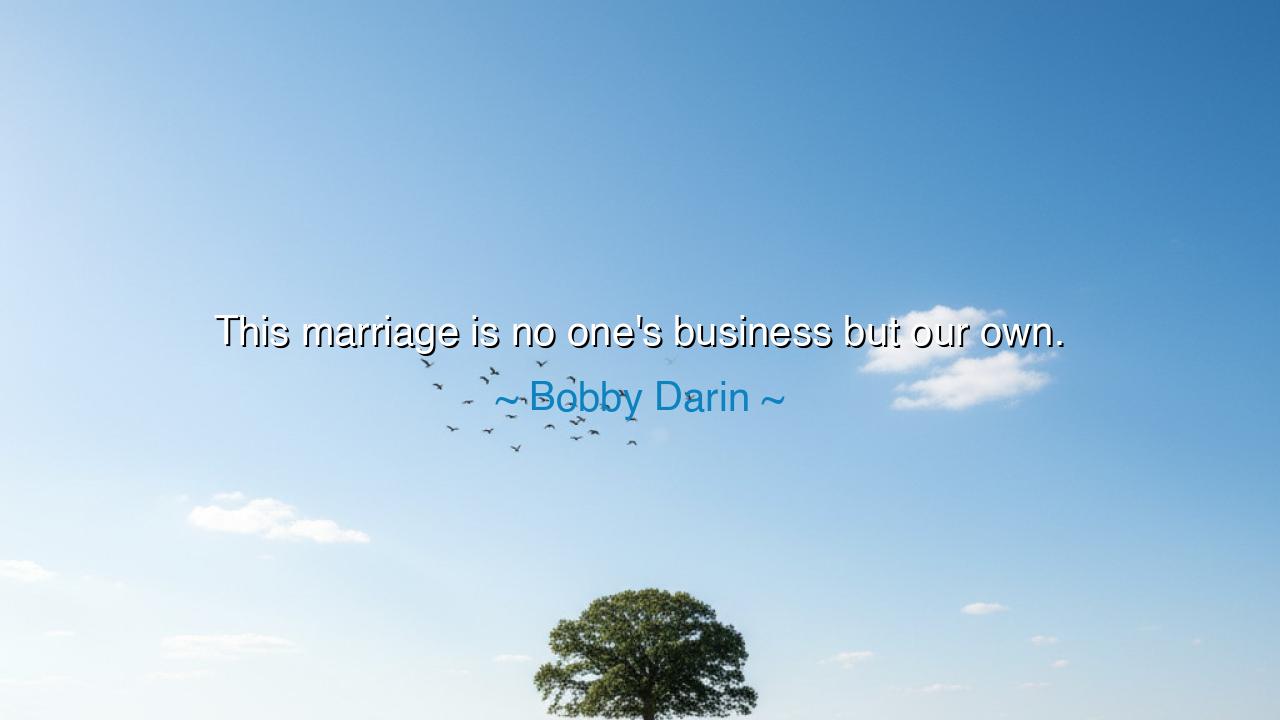
This marriage is no one's business but our own.






In the vast spectrum of human experience, few bonds are as sacred and personal as the union of two souls in marriage. Bobby Darin's words, “This marriage is no one's business but our own,” carry with them a profound declaration of autonomy and privacy—an affirmation that the deepest of human relationships, those bound by love, should remain untouched by the judgment and interference of others. Marriage, as Darin asserts, is not just a contract of two individuals before the world, but a deeply personal commitment between two people, and as such, it should be respected as their private domain.
The ancients, too, understood that the union of two individuals was one of the most sacred of bonds, but they also grappled with the societal expectations that often sought to impose itself on private lives. Socrates, the great Greek philosopher, married Xanthippe, a woman often described as difficult, yet their union was deeply private, despite the public nature of their lives. Socrates spoke often of the importance of personal virtue and the self-examination required for a life well-lived. He believed that no one could truly judge the essence of a relationship unless they truly understood the hearts of those involved. Similarly, Darin speaks to the sanctity of marriage, declaring it as a personal bond, free from the scrutiny and expectations of the wider world.
The Roman philosopher Seneca also explored the tension between public life and private relationships. He believed that a life of true virtue could not be achieved if one's personal connections were always subject to the gaze of others. Marriage, in his view, was not just a public contract but a sacred pact between two individuals who sought mutual respect, love, and understanding. The essence of marriage was found in the connection between two people, not in how they were perceived by society. Thus, Darin’s reflection—where marriage is no one else’s business but the couple's—aligns with Seneca's view that true freedom and joy in a marriage can only be found when it is free from outside judgment.
Consider the example of Antony and Cleopatra, whose marriage was both a political and personal union. While their love was real, it was also shaped by the pressures of Roman politics and public perception. Their story, filled with romance and tragedy, reveals the tensions between the private nature of their love and the public obligations that demanded their relationship be viewed through the lens of empire and power. Yet, despite the political forces at play, their commitment to one another was undeniable. It is within this framework of privacy and public interference that we understand the true power of Darin’s statement: no matter the pressures from the outside world, the true essence of marriage lies in the commitment and respect between the individuals involved.
In our own time, Darin’s words remind us of the power of privacy in the realm of relationships. Marriage is an intimate and personal commitment, and while it may be celebrated publicly, its true meaning is only known to those who are bound by it. The constant intrusion of society’s expectations, whether through judgment, expectations, or unsolicited advice, can weaken the very foundation of a relationship. The lesson here is clear: marriage, like any bond of love, should not be judged or dissected by those outside of it. It is a union that requires trust, respect, and understanding—a deep, internal connection that only the two individuals involved can truly know and define.
Let us take this lesson into our own lives, remembering that marriage is a personal journey between two people, and while the world may have its opinions, those opinions should not diminish or define the strength of that bond. In a world that is quick to judge and quick to intervene, we must honor the privacy of others, especially in matters as sacred as love and commitment. Let us not be swayed by external expectations but instead focus on the core values that make any relationship strong: trust, communication, and respect. We are each entitled to live our lives according to our own values, free from the interference of those who do not truly understand the depths of our hearts.
As Darin so powerfully reminds us, marriage is no one’s business but the individuals who choose to share that sacred bond. May we honor the privacy and sanctity of such unions, allowing them to flourish without the burdens of external judgment. In doing so, we create a world where love is celebrated not through the eyes of others but through the quiet, enduring connection between two people who stand side by side, navigating life’s challenges together.






AAdministratorAdministrator
Welcome, honored guests. Please leave a comment, we will respond soon